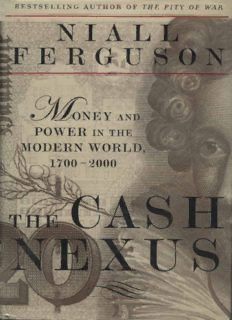
The Cash Nexus: Money and Power in the Modern World, 1700-2000 PDF
Preview The Cash Nexus: Money and Power in the Modern World, 1700-2000
B E S T S E L L I NG A U T H OR OF THE PITY OF WAR NI AL E R G U S ON ONEY AND POWER IN THE MODERN WORLD, 1700-2000 A SH x us $30.00 US $44.95 CAN idea that money makes the world go round is a seductive one. From class conflict to the "feel good" factor, from Karl Marx to Bill Clinton, few of us would deny the importance of the econo my in politics. Economic change has seemed to he the prime mover of political change whether in the age of industry or the Internet. The Clinton cam paign motto in 1992—"It's the economy, stupid"— sums up a central assumption of modern life. In The Cash Nexus, Oxford historian Niall Ferguson challenges this assumption by offering a radical new history of the relationship between economics and politics. Setting contemporary issues in a three hundred year historical perspec tive, he brilliantly redefines the "cash nexus"— the pivotal link from money to power. Throughout modern history, Ferguson argues, the way states have managed their money has been crucial to their survival and success. It has been finance as much as firepower that has decid ed the fates of nations in the supreme test of war. And war itself has been the principal engine of financial innovation. Our lives today are still dom inated by the institutions of the warfare state: income tax, parliaments, national debts, central banks and even stock markets. This is the "square of power" on which the great Western empires have been based. Yet the evolution of these institutions over three centuries has been anything but a one-way street. There is no universally optimal equilibrium in the balance between taxing and borrowing, and sometimes a high debt burden can be a source of strength rather than weakness. The democratiza tion of parliamentary institutions in the twentieth century has not always been conducive to econom ic stability and a bigger tax base. Sometimes the square of power can collapse into tax revolts, defaults, inflations or financial panics. Ferguson arrives at provocative conclusions. Domestic political power may have more to do with campaign finance than with pre-election (continued on back flap) (continued from front flap) prosperity; but we should spend more, not less, on the democratic process. Financial globalization in the absence of imperial rule may prove too unsta ble to last; compared with past superpowers, the United States is neglecting its international responsibilities. Stock market bubbles and exchange rate crises may just be harbingers of a deeper crisis that could roll back the advance of democracy and capitalism. A bold synthesis of political history and mod ern economic theory, The Cash Nexus has chal lenging and unsettling implications for the future of both capitalism and democracy. Its challenge to the United States to make more political use of its unmatched economic resources is bound to spark heated debate. NIALL FERGUSON is Professor of Political and Financial History at the University of Oxford and Visiting Professor of Economics at the Stern School of Business, New York University. He is the author of Paper and Iron, The House of Rothschilds, and Basic's own The Pity of War and Virtual History. He writes regularly for the Times Literary Supplement and is a prolific commentator on contemporary politics. He is currently at work on a major new history of the Saxe-Coburg House of royalty. Jacket design: Tom Stvan; author photograph: Marc Atkins 2/01 The Cash Nexus ALSO BY NIALL FERGUSON The Pity of War Virtual History: Alternatives and Counterfactuals (editor) The House of Rothschild Paper and Iron: Hamburg Business and German Politics in the Era of Inflation, iH^j-i^zj N I A LL F E R G U S ON The Cash Nexus MONEY AND POWER IN THE MODERN WORLD, I7OO-20OO BBASIC BOOKS BASIC BOOKS Copyright © 2001 by Niall Ferguson Published by Basic Books A Member of the Perseus Books Group All rights reserved. Printed in the United States of America. No part of this book may be reproduced in any manner whatsoever without written permission except in the case of brief quotations embodied in critical articles and reviews. For information, address Basic Books, 10 East 53 rd Street, New York, NY 10022-5299. A Cataloging-in-Publication record for this book is available from the Library of Congress. ISBN 0-465-02325-8 01 02 03 / 10 9 8 7 6 5 4 3 2 1 For Mary and May In these complicated times . . . Cash Payment is the sole nexus between man and man . . . Cash Payment the sole nexus; and there are so many things which cas will not pay! Cash is a great miracle; yet it has not all power in Heaven, nor even on Earth. . . . THOMAS CARLYLE, Chartism (1840) The Gospel of Mammonism . . . has also its corresponding heaven. For there is one Reality among so many Phantasms; about one thing we are entirely in earnest: The making of money. . . . We have profoundly for gotten everywhere that Cash-payment is not the sole relation of human beings. THOMAS CARLYLE, Past and Present (1843) The bourgeoisie ... has left remaining no other nexus between man and man than naked self-interest, than callous 'cash payment'. MARX AND ENGELS, The Communist Manifesto (1848) We are told by men of science that all the venture of mariners on the sea, all that counter-marching tribes and races that confounds all history wiht its dust and rumour, sprang from nothing more abstruse than the laws of supply and demand, and a certain natural instinct for cheap rations. To any one thinking deeply, this will seem a dull and pitiful explanation. ROBERT LOUIS STEVENSON, "Will o' the Mill" (1978)
Description: